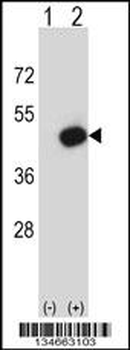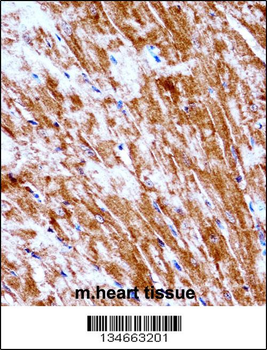You have no items in your shopping cart.
Mouse Pdk2 Antibody (N-term)
Catalog Number: orb1936154
| Catalog Number | orb1936154 |
|---|---|
| Category | Antibodies |
| Description | Affinity Purified Rabbit Polyclonal Antibody (Pab) |
| Species/Host | Rabbit |
| Clonality | Polyclonal |
| Clone Number | RB34663 |
| Tested applications | IHC-P, WB |
| Predicted Reactivity | Rat |
| Reactivity | Human, Mouse |
| Isotype | Rabbit IgG |
| Dilution range | WB: 1:1000, WB: 1:1000, WB: 1:1000, IHC-P: 1:10~50 |
| Form/Appearance | Purified polyclonal antibody supplied in PBS with 0.09% (W/V) sodium azide. This antibody is purified through a protein A column, followed by peptide affinity purification. |
| Conjugation | Unconjugated |
| MW | 46041 Da |
| Target | This Mouse Pdk2 antibody is generated from rabbits immunized with a KLH conjugated synthetic peptide between 78-107 amino acids from the N-terminal region of mouse Pdk2. |
| UniProt ID | Q9JK42 |
| NCBI | NP_598428.2 |
| Storage | Maintain refrigerated at 2-8°C for up to 2 weeks. For long term storage store at -20°C in small aliquots to prevent freeze-thaw cycles |
| Alternative names | [Pyruvate dehydrogenase (acetyl-transferring)] kin Read more... |
| Note | For research use only |
| Expiration Date | 12 months from date of receipt. |

Mouse Pdk2 Antibody (N-term) western blot analysis in HepG2 cell line lysates (35 ug/lane). This demonstrates the Pdk2 antibody detected the Pdk2 protein (arrow).

Mouse Pdk2 Antibody (N-term) western blot analysis in mouse heart tissue lysates (35 ug/lane). This demonstrates the Pdk2 antibody detected the Pdk2 protein (arrow).

Western blot analysis of Pdk2 (arrow) using rabbit polyclonal Mouse Pdk2 Antibody (N-term). 293 cell lysates (2 ug/lane) either nontransfected (Lane 1) or transiently transfected (Lane 2) with the Pdk2 gene.

Mouse Pdk2 Antibody (N-term) immunohistochemistry analysis in formalin fixed and paraffin embedded mouse heart tissue followed by peroxidase conjugation of the secondary antibody and DAB staining. This data demonstrates the use of Mouse Pdk2 Antibody (N-term) for immunohistochemistry. Clinical relevance has not been evaluated.



